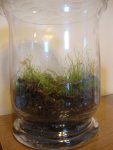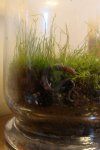Mrs Embers
New member
- Joined
- Jan 31, 2010
- Messages
- 5
- Reaction score
- 0
- Points
- 0
- Country
- Canada
If anyone has any advice to offer, I'd really appreciate it!
I was cleaning my basement last night and found a red-back(ed) salamander under some cardboard. I couldn't put him outside in the snow, so he's now living in a terrarium I put together back in the summer- there's soil, local mosses, and a few stones in there with him right now. (pictures attached)
I've done as much reading on the species and general terrestrial salamander care as there is available on this site, but I still have a few questions:
-he seemed very sluggish when I found him, I assume because it's winter and rather cold. Should I try keeping the terrarium in the basement over the winter to preserve that temperature? He perked up a bit over night while upstairs (upstairs is still under 20 degrees C). If he's in the cold basement, will he eat less?
-he was also surprisingly dry- any salamanders I've seen outside were moist/slimy-looking. Is a moist terrarium environment enough to help with this, or do I need a tiny water dish?
- in the past I've only watered (misted) terrariums once every few weeks, as the mosses seemed to do well with that. Should I keep up that schedule, or mist more frequently now that there's a guest in there?
-Does this little guy need more space?
- last question (I think): assuming I can hunt down suitable food for this little guy and keep him alive over the winter, should we release him back into the wild, or assume that he'll be used to getting fed?
Like I said, any advice would be much appreciated. We love having animals around, but have never had a pet salamander before.
Thanks!
I was cleaning my basement last night and found a red-back(ed) salamander under some cardboard. I couldn't put him outside in the snow, so he's now living in a terrarium I put together back in the summer- there's soil, local mosses, and a few stones in there with him right now. (pictures attached)
I've done as much reading on the species and general terrestrial salamander care as there is available on this site, but I still have a few questions:
-he seemed very sluggish when I found him, I assume because it's winter and rather cold. Should I try keeping the terrarium in the basement over the winter to preserve that temperature? He perked up a bit over night while upstairs (upstairs is still under 20 degrees C). If he's in the cold basement, will he eat less?
-he was also surprisingly dry- any salamanders I've seen outside were moist/slimy-looking. Is a moist terrarium environment enough to help with this, or do I need a tiny water dish?
- in the past I've only watered (misted) terrariums once every few weeks, as the mosses seemed to do well with that. Should I keep up that schedule, or mist more frequently now that there's a guest in there?
-Does this little guy need more space?
- last question (I think): assuming I can hunt down suitable food for this little guy and keep him alive over the winter, should we release him back into the wild, or assume that he'll be used to getting fed?
Like I said, any advice would be much appreciated. We love having animals around, but have never had a pet salamander before.
Thanks!


